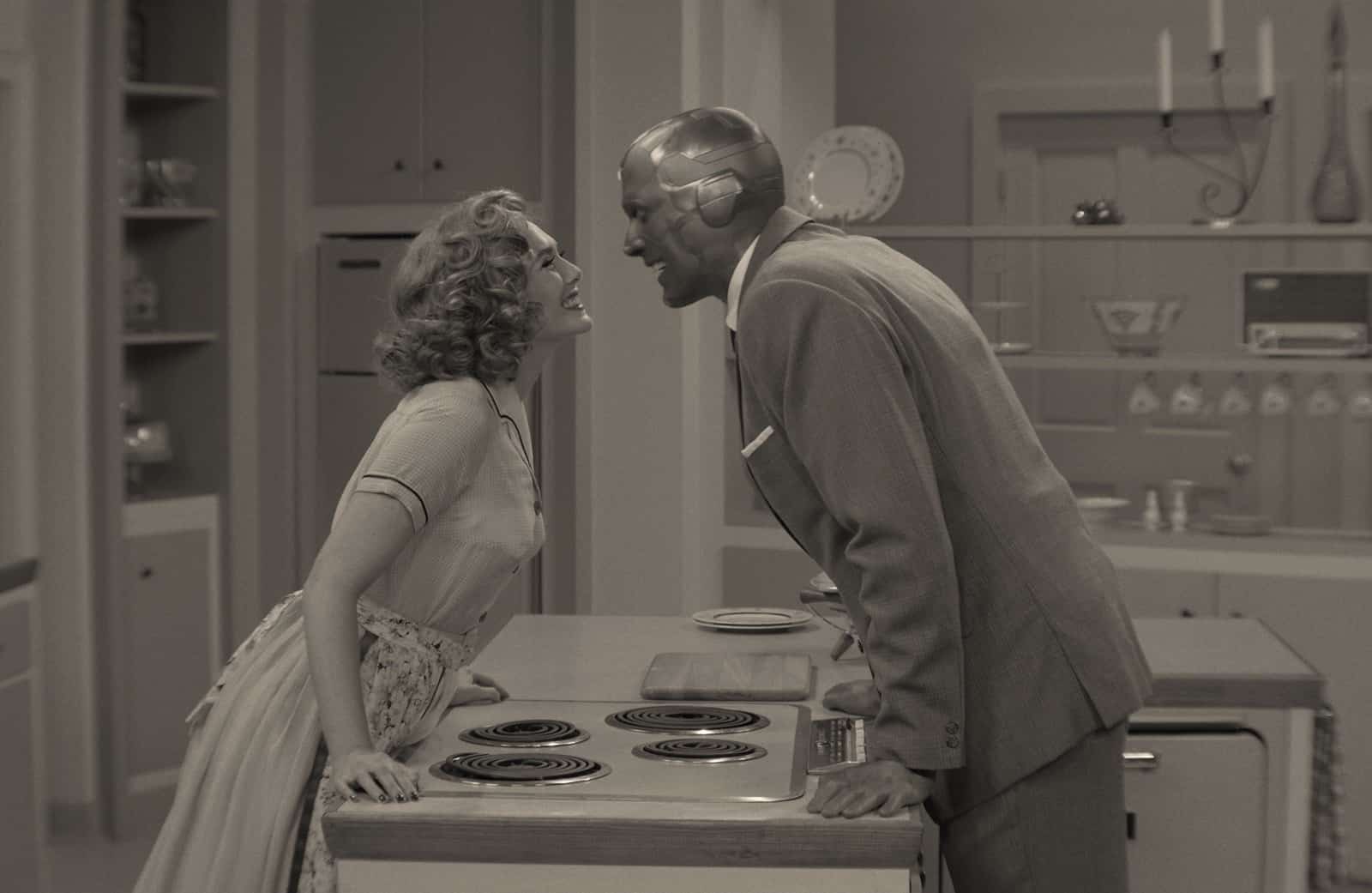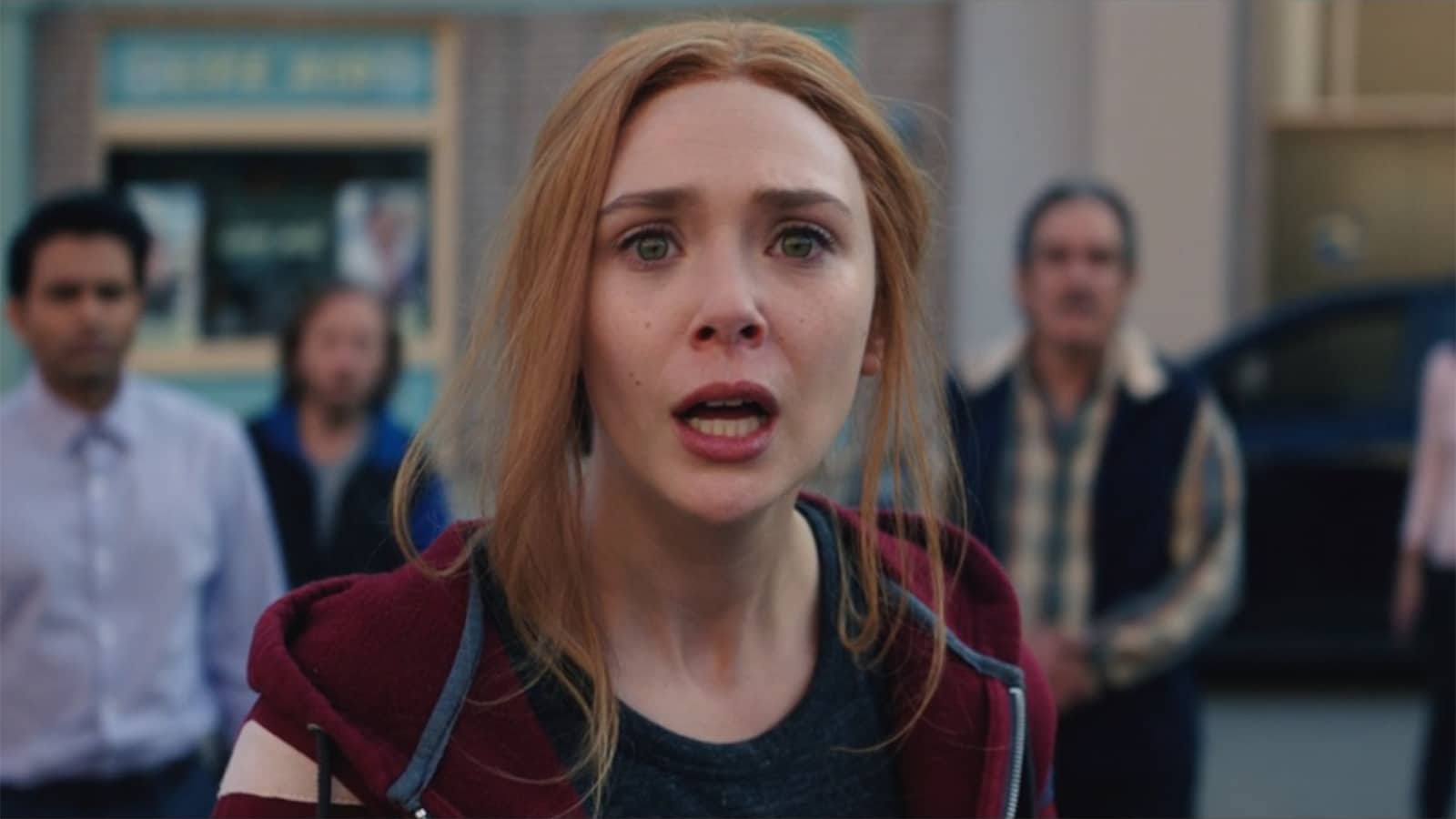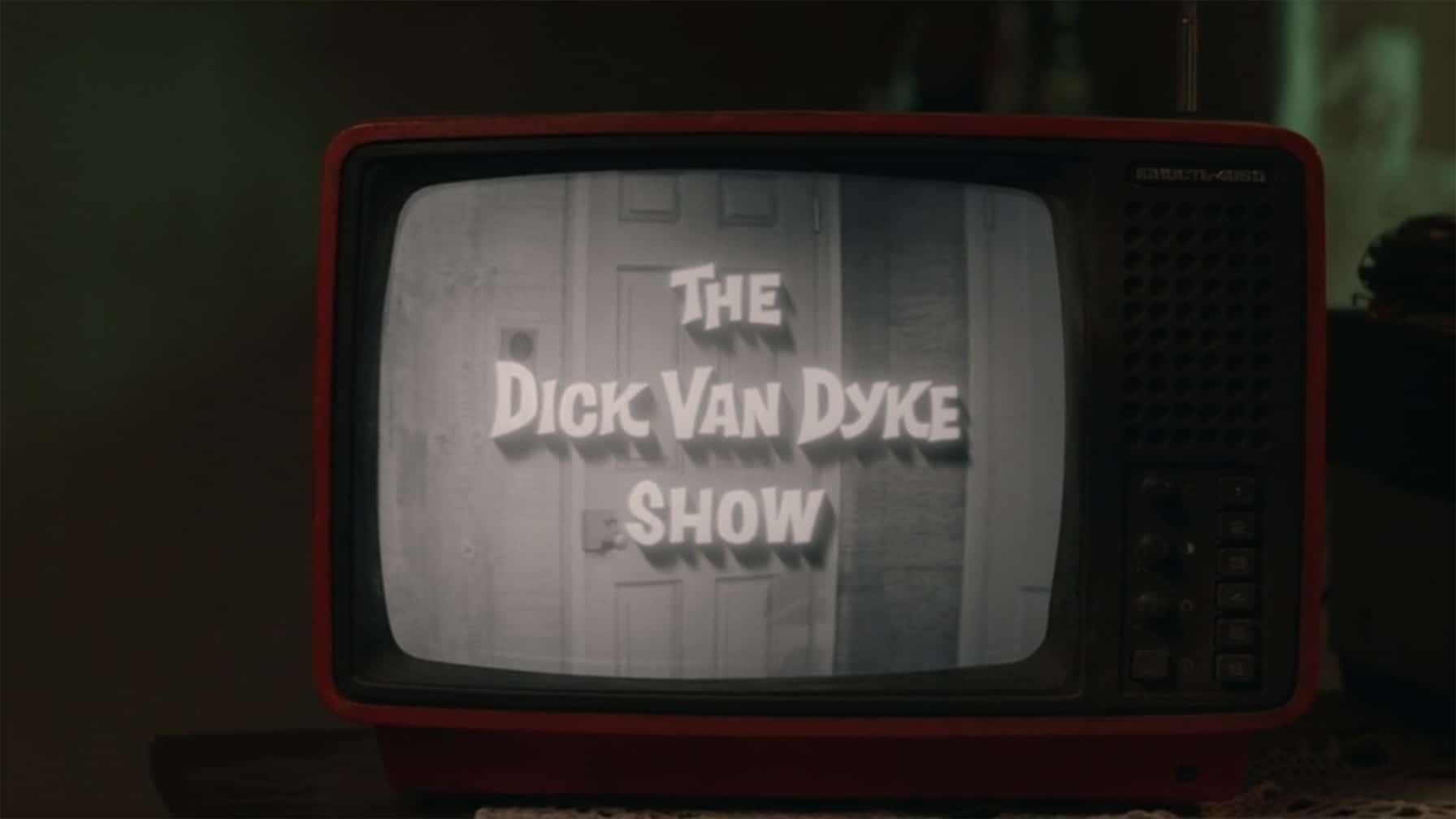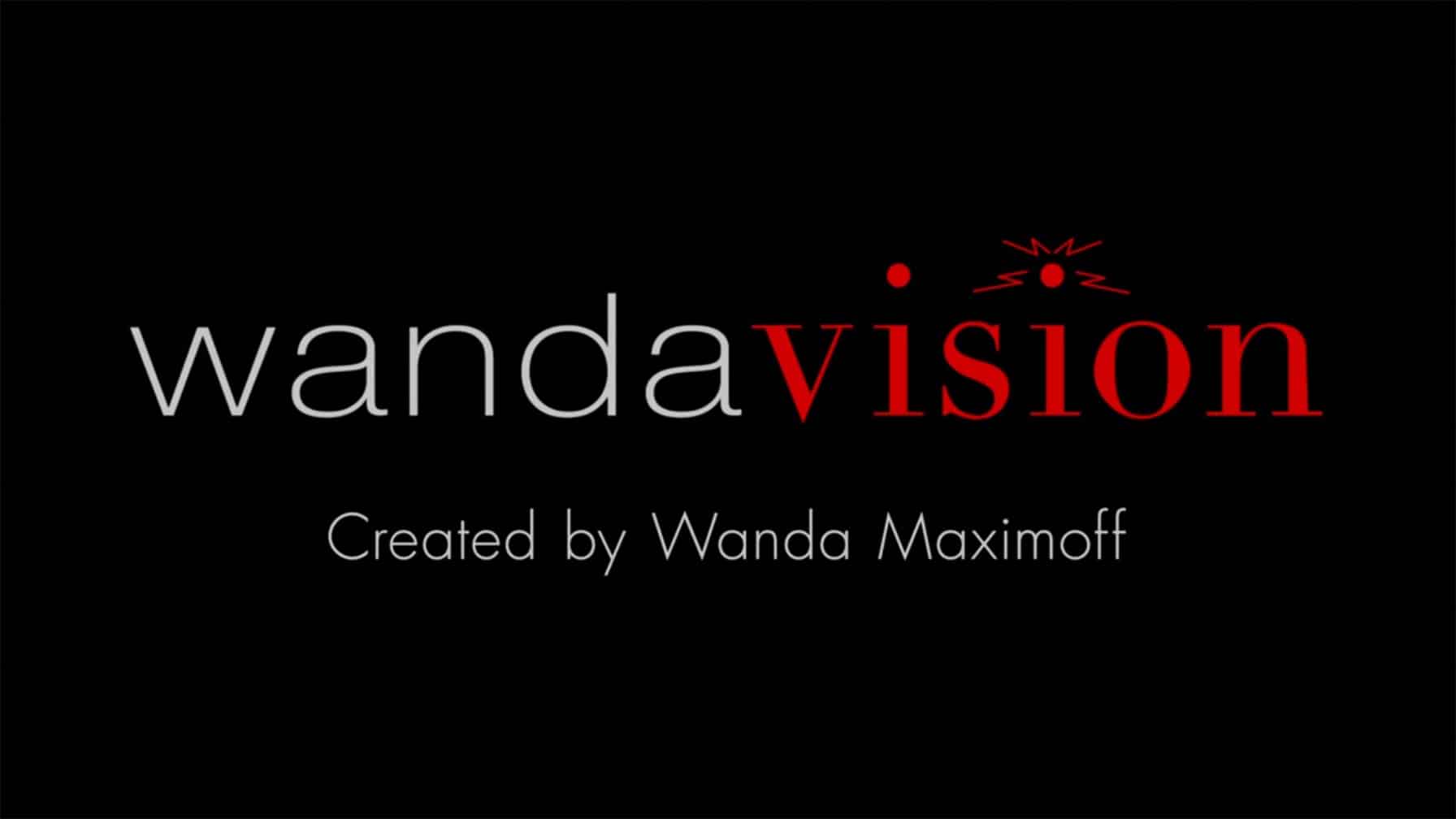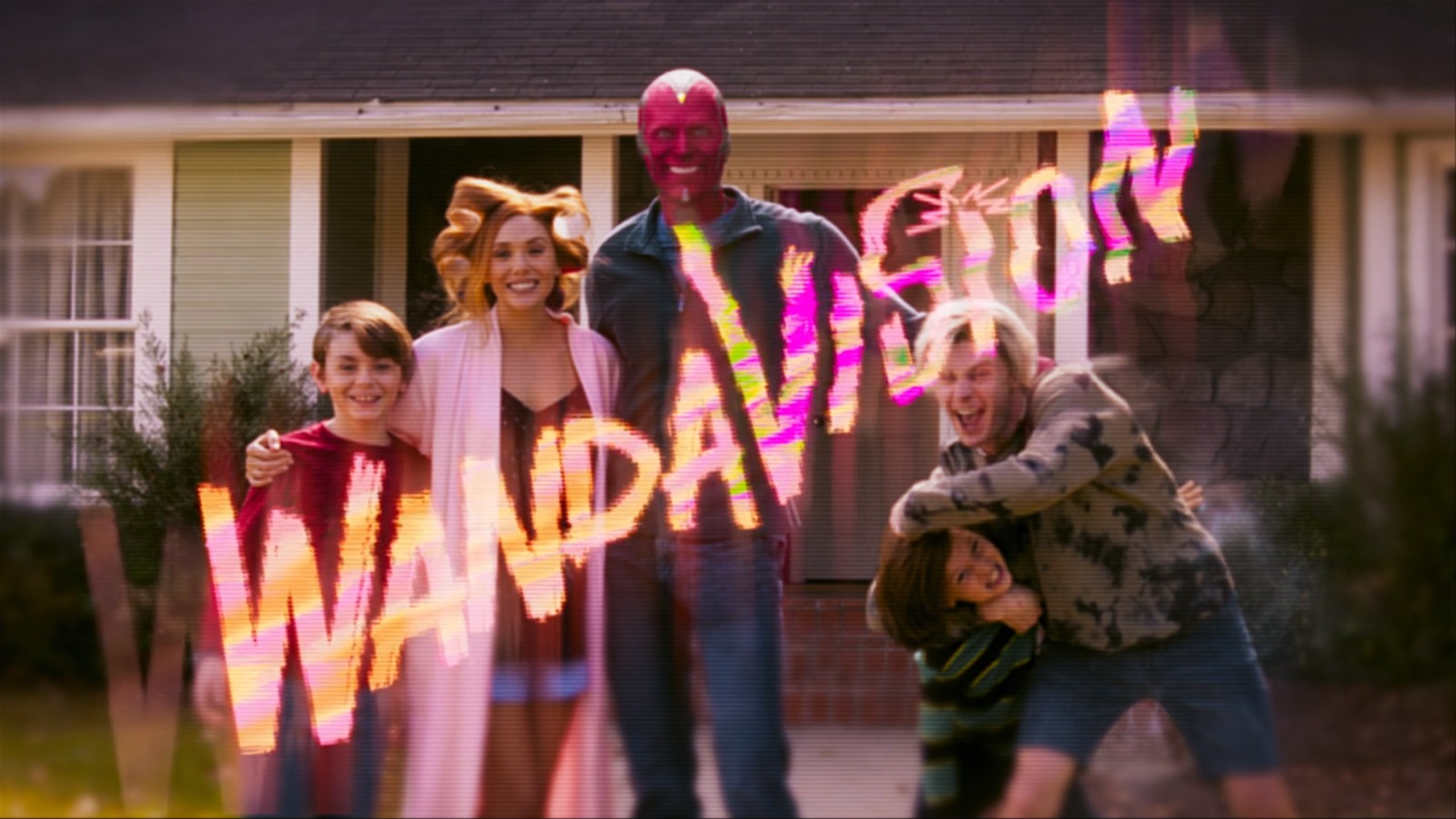[Please note, this piece talks in deep on WandaVision episodes 1 and 2, and as such contains spoilers for both episodes. Consider yourselves warned!]
Mikey Zee: You’re traveling through another dimension—a dimension not only of sight and sound but of mind….
Charlie Davis: Uh. Hello? Hello? Um… Mikey, is everything black and white for you? Because everything is black and white for me and I’m pretty sure that’s not… normal.
MZ: Why, whatever are you talking about, dear? Of course everything is black and white… we’re watching WandaVision!
Laugh Track: [laughs]
MZ: But seriously. Welcome everyone to our first iteration of There is Nothing Wrong With Your WandaVision, a weekly column where I, Mikey, talk about the latest episodes of the Marvel Cinematic Universe (aka the MCU)’s latest outing along with a slate of guest writers. And who better to kick this off than CXF’s very dear editor, Charlie. So Charlie, other than the distinct lack of color, what else first springs to mind about the series based on these first two episodes?
CD: The first thing that jumped out at me is the fact that… it’s kind of like an anti-mystery at this point. Sure, there is something bigger at play here, but it’s not obtusely hiding something from us. The first two episodes are basically two very concise 22 minute sitcom episodes. So let’s uhhhh talk about that first.
MZ: Absolutely, and to do that, I need to provide a bit of context. I’ve seen a lot of press both before the premiere and after throwing around Twin Peaks comparisons; tons of easter egg hunt and theory-crafting articles… So often when you see something described as “Lynchian,” it’s just shorthand for inexplicable or bizarre. I think that really does both the works of David Lynch and the thing being compared to Lynch a disservice.
It’s important to remember that Twin Peaks is more than just whacky, cartoon melodrama turned up to the extreme. Twin Peaks really represented a sea-change in how we think about primetime TV. It took something people thought of as “low art” in the soap opera, and turned it into primetime appointment viewing. Twin Peaks isn’t really about the weirdness, or even the mystery, though that’s definitely part of what kept people watching; it’s about a deeper emotional core, and how the mystery affects these characters.
This stands in sharp contrast to the way a lot of modern shows treat mystery elements. Honestly, we can blame a lot of that on JJ Abrams and LOST, but the Nolan brothers definitely continue the trend. Modern mystery shows are all about the puzzle box, the easter egg, the Reddit theory post.

I think that the idea that a mystery exists as a puzzle for the viewer to solve is a storytelling device media relies on a bit too heavily today, and the internet news cycle too: the idea that everything has to be a reference. So when something like WandaVision comes around, where its mystery acts as a reflection of the emotional core, trying to treat it as a puzzle box is baffling because that’s not the point of the thing. This show is less the cerebral blockbuster of Nolan or Abrams, and more akin to if Kubrick or Arronofsky made a sitcom, as wild as that sounds.
CD: That’s such an important point. People somehow forget that Twin Peaks was on primetime television and skip straight to the weird as being the prime factor. I remember watching a David Lynch interview from a documentary where he stated that he wanted to make television that mattered. Lynch is less about the weird really and more about the feeling, the aesthetic, and ultimately the emotion that it will ring out of you. With all that context laid at our feet, let’s get down to business.
What an absolutely delightful start to the series. The last time we saw Vision in the MCU he got killed by Thanos, and Wanda got snapped away only to return and attempt to give Thanos a reckoning with the rest of the Avengers. After that… well. Your guess is as good as mine. Let’s sweep all that away for a moment because the series certainly wants us to.
MARVEL AT NITE

MZ: Okay, first off, I absolutely adore how whole-hog they went on the pastiche of mid-century sitcoms here. As someone who grew up watching those shows, and the Adam West Batman shows, they absolutely nailed the atmosphere here.
CD: They did! And honestly, it was a pretty bold thing to do considering how well-honed the MCU formula is at this point. I am not gonna give Marvel any kudos they don’t deserve, but going all in on a 22 minute sitcom and committing to it is very good. It’s got the charm and the comedic timing.
MZ: I can’t emphasize enough how much the show’s humor genuinely works. Also, Kathryn Hahn is a GEM from the moment she steps on camera as Agnes.
CD: Something that I noticed on a third watch, it’s not just a homage or a parody, it’s a show made with the same mindset those early sitcoms had. It’s not just a thin coat of black and white paint, we’re in the whole bucket. It feels like a rerun I might see on Nick at Nite and honestly, as a person who grew up watching Nick at Nite, it’s nailing that late night rerun feeling as well.
MZ: If anything, the parody aspects come up most not in the format—because like you, I think they’re playing the genre straight—but the period of the United States in the 1950s and 60s. References to Bolsheviks, beatniks, and more exist as a light-hearted wink and a nod to the attitudes of the time, but without ever getting dare I say, political about it. As you and I learned from America in Primetime, which is a great (if hard to find) look at the evolution of US primetime TV, that light-heartedness typifies the black and white paint bucket as well. Sitcoms were designed to make you laugh, and be a mirror to American culture but not make you think too deeply about anything.
My thought on that is, there’s a time and a place for thinking deeply, and honestly I think keeping it at that level of depth was the right play. There’s a couple references to Wanda being Sokovian, and while I’m still frustrated that MCU Wanda was whitewashed out of her Jewish and Romani heritage, I’m glad they don’t try to address it in a haphazard fashion here.
CD: Let’s face it, there are a lot of things that could go wrong here. Wanda and Vision are both just SO complicated, but the MCU has seemed to release them a bit from the baggage of their complicated pasts and present. With that, comes all the good and the bad like you said, erasing some very important things in the process. However, for what it takes, it gives both of them some genuine likability that I think both characters lacked in every movie they showed up in. Showcasing them in a sitcom scenario gives us time to see both how funny these characters can be and maybe most surprising of all, how deeply they care about one another. I’ve never really been sold on Wanda and Vision as a couple, but this right here… I buy all of this.
MZ: That’s something I didn’t appreciate until a rewatch—how much this show makes it easy to believe they love each other, forgetting the messy characterization of before. Let’s face it; Wanda’s introduction in Age of Ultron was messy, and she traded a paternalistic Magneto for a controlling Vision in Civil War. Giving both she and Vision some space to be human is… refreshing.
CD: So refreshing and I think that that right there, is the reason that they chose this type of format. The weirdness is lurking around the edges in the first two episodes, but it creeps up and then backs away. It sticks in your mind, but the episodes are structured and played so straight to the source material that you can honestly just forget about it until it pops back up again. It gives Wanda and Vision the time to show themselves in a rather warm way considering what may be afoot here. Everything is picture perfect. Wanda looks beautiful in the outfits they have chosen for her here and everything slots together so well. I think we’d be remiss if we didn’t talk about how accurate episode 1 hones to shows like Dick Van Dyke and I Love Lucy and how it subtly shifts to just a few years later to a show like Bewitched. I am sort of enamoured with how it nails both of those things so well.
MZ: Yes. And speaking of Wanda’s outfits… everything they have her wearing manages to homage her costumes while still perfectly suiting the era, which is kind of an incredible feat. Big ups to the costuming department.
INVASION OF THE MEMORY-SNATCHERS

MZ: Okay, I think we’ve buried the lede enough… I’m sure a lot of our readers are wondering what, exactly, this mystery we keep talking about is.
CD: Well, it’s pretty hecking apparent that not everything is as it seems here in TV Land. Even if these episodes could work as a really solid superhero sitcom, there are plenty of things that let us know that this world that’s been built might have more in common with Pleasantville than Bewitched. Wanda and Vision both cannot remember when they were married, they cannot recall small details of when they showed up in Westview. Vision’s place of employment doesn’t make anything but forms and he cannot quite get to the bottom of it. Oh and then the surreal choking scene that breaks the genre near the end of episode 1. There are a lot of tropes at play here, but there are a few things in episode 2 that make me think that the one part of Wanda’s messy past in comics has been hopefully left behind. I think… I hope… I PRAY that Wanda is at least somewhat in control of what is happening here.
MZ: Okay, so let’s start with that dinner scene. The show sticks pretty firmly to the multi-camera format. So it feels like a big deal when Wanda has what is, in essence, a panic attack at being unable to remember anything about her history. The camera slowly zooms in on her face, and then flashes between the faces of her dinner guests, in a way that draws the tension out in an absolutely delicious way. I love how that scene worked. Especially with the detail that what Mr. Hart was choking on, was Wanda’s chocolate-covered strawberry.
CD: The slow escalation of the horror is what makes it effective. I truly do believe that Wanda is in control of this for good or for ill, but the second episodes and its horrific hiccups leave me wondering a bit more about that. There is the technicolor helicopter Wanda finds in the bushes and then there is the moment with Dottie and the radio, which I think is my favorite moment in either episode. The broken glass, the bright red blood… Dottie’s expression of confusion when something breaks in her mind for just a moment before the track picks up where it left off. What has happened to all these people; and is Wanda to blame for it?
MZ: And again, all of these moments that break the simulation, if you will, are ones where we are pulled out of the multi-camera format, with the camera panning or slowly zooming, to keep us with Wanda and reinforce where her head is at.
Let’s talk about that radio, and who might be behind all this. By doing a sneaky investigation, you and I figured out that the man on the radio is none other than Agent Woo, Randall Park’s character from Antman and the Wasp. So, who exactly is this mysterious man, for those who might not remember?
CD: Agent Woo was the goofy yet ultimately well-meaning FBI agent who was placed in charge of Scott Lang’s house arrest case. All of that movie took place before the snap so it’s anyone’s guess what Agent Woo might have gotten up to after the planet was restored in Avengers Endgame. Well, I say that, but the world that we see outside of wherever Wanda and Vision are has given us one more pretty huge visual clue. The symbol that pops up is that of S.W.O.R.D (Sentient World Observation and Response Department) who are basically S.H.I.E.L.D, but in space and now in current continuity, run exclusively by mutants. We’ve never seen S.W.O.R.D in the MCU before, but it’s understandable that they might have been established to deal with very cosmic threats such as, you know, the big snappening.
MZ: I actually don’t think she’s in control, but I’ll get to that in a second… The interesting thing about S.W.O.R.D. here is, they could be absolutely anything. This is the first time they’ve shown up in the MCU. I’m not going to go into undue speculation, because as we said before, that feels against the nature of the show. However, we know from previews that Monica Rambeau—present in the Westview world as a similarly-amnesiac ‘Geraldine’—is a member of S.W.O.R.D., and a certain, uh, beekeeper bears the S.W.O.R.D. emblem as well, which honestly is probably the most singularly-distressing occurrence yet.
And there’s a reason I’m not assuming he’s a member of S.W.O.R.D. yet. This appearance of Swarm, a villain probably best known in comics as a C-list Nazi bee scientist, feels almost as if Wanda’s psyche is intruding on the perfect world either S.W.O.R.D. or she has created for herself.
To go back to the snap… Vision was one character who was noticeably absent from the Endgame big show, assumedly he was killed prior to the snap. So, someone has brought him back to live in this simulation, and Wanda’s past traumas are invading the perfect simulation as we slowly travel through the decades of American television. I feel like the post-script on Episode 1 is showing that whoever is running the simulation, it isn’t Wanda… but I do have a feeling she had agency at some point, and made a metaphorical devil’s bargain to live with Vision again.
FROM THE PAGE TO THE SILVER SCREEN

CD: Which leads us back to some of the comics threads that I am desperately hoping that they don’t pull on. A lot of Wanda’s most well-known stories strip her of her agency and push the idea that a woman with a mental illness or one that’s suffering from trauma is ultimately unstable and incapable of taking care of herself or others. Wanda, specifically, was driven to a mental break because her children were taken from her, and her friends covered up the fact that anything bad had happened at all. Some damn friends. Let’s chat about comics as our final act.
MZ: Yes. Especially because at the end of the second episode, Wanda magically becomes pregnant.
So, if Agnes isn’t Agatha Harkness, the witch that in comics canon is first Wanda’s mentor and later the ghost haunting her idyllic construct-world, I’m pretty sure the entire comics community will eat their collective hat.
The commercials, too, feel like subtle intrusive thoughts from people who in the movie tried to destroy Wanda’s life, from Baron von Strücker to Stark Industries, whereas in Wanda’s constructed world of House of M, she found ways to punish the non-mutant heroes that never supported her. So the tone feels a bit different already. It’s also worth mentioning that both of the writers and the showrunner for WandaVision are women, and none of the writers for the major plot arcs we’re referencing were women, which already gives me some faith that Wanda’s trauma will be handled better than in the comics.
CD: It’s really important to also remember that Wanda has NONE of this backstory in the MCU. She doesn’t know Agatha Harkness, she’s only been romantically involved with Vision for maybe a few years and she is not a mutant, as they do not exist in the MCU at the moment. It would be weird if not confusing to bring any of these elements into this story in the exact same way, and they seem to be on track of doing it uniquely while keeping some of the same flavors. Hell, Wanda doesn’t even have the same powers she does in the comics and certainly not the ones that caused any reality-altering issues. But… I keep coming back to that device Tony made in Civil War. The one that lets you live through your traumas again and maybe fix things? I am very interested if that is going to pop back up again.
MZ: Oh, geez, I totally forgot about that device! That fits in very neatly with the tagline for the Stark Industries toaster commercial we see: “Forget the past… THIS is your future.” If I’m remembering correctly, there is a precedent in comics for S.W.O.R.D. being put in charge of abandoned, powerful tech. I could totally see a world in which Pepper charted this nascent organization with keeping charge of some of Tony’s most out-there tech, and also agreed to do Wanda a solid at the same time…
The big question I keep asking myself is: to what end? And that is something that the show seems very comfortable playing close to its chest. I, for one, am content letting the mystery unfold at pace and enjoying the sitcom antics along the way. All I’ve wanted for literal years is a superhero sitcom, and now we have one with a twist. It’s not perfect—few things outside of a morally-dubious simulation are—but I for one am happy with the result. What about you, Charlie?
CD: All I have ever wanted for Wanda is a place where her character can flourish, as it seems like the 616 cannot actually be that place without some MAJOR, MAJOR reconstruction. I am very happy with the opening salvo of WandaVision and am very excited to go along for the ride. I am LOOKING as the kids might say.
THE END

